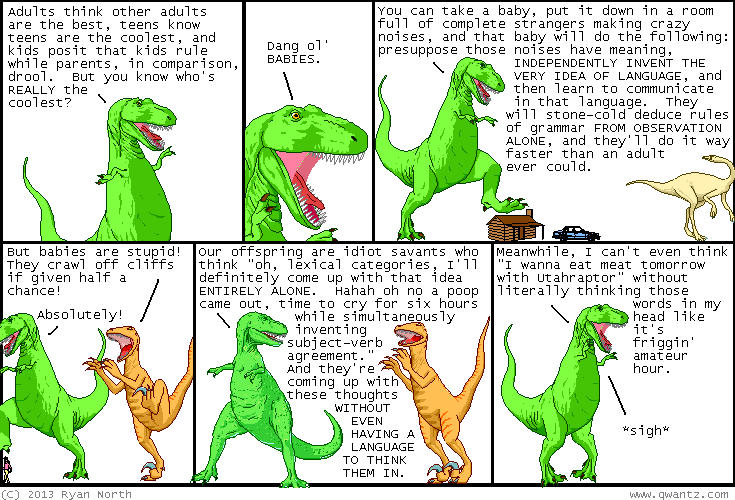Who's REALLY the coolest?
« previous post | next post »
Dinosaur Comics for 8/26/2013:
Click on the image for a larger version that lacks some mouseover text helpfully glossing what is expressed by “*sigh*”.
Hat tip: Bonnie Krejci
September 14, 2013 @ 3:07 pm · Filed by David Beaver under Language acquisition, Linguistics in the comics
« previous post | next post »
Dinosaur Comics for 8/26/2013:
Click on the image for a larger version that lacks some mouseover text helpfully glossing what is expressed by “*sigh*”.
Hat tip: Bonnie Krejci
September 14, 2013 @ 3:07 pm · Filed by David Beaver under Language acquisition, Linguistics in the comics
Powered By WordPress

Carl said,
September 14, 2013 @ 5:29 pm
Chomski's universal grammar is out. North's universal coolness is in.
leoboiko said,
September 14, 2013 @ 7:54 pm
Link is pointing to #2940 "You are totally wrong: A web card", thus being a self-referential wrong link.
Chomskian comic is #2479 at http://www.qwantz.com/index.php?comic=2479
Thank you. Corrected. -dib
Ben said,
September 16, 2013 @ 2:18 pm
Great comic. However, the line "faster than any adult ever could" : is that anything more than a common trope? You often here people say (or write) things like "babies/children learn language so easily". I guess it seems easy because babies don't study verb conjugation tables and vocab flash cards. But if you really think about it, the time to real fluency for a child is quite extended–years. To put it another way, I think that if an adult had nothing to do but sit around all day, listen, and babble (practice phonemes?) while nearby adults give extravagant praise for uttering even a single word semi-correctly at first, that adult could learn a new language pretty well too!
leoboiko said,
September 16, 2013 @ 5:51 pm
I've always had much the same doubt as Ben.
If we want to compare babies acquiring their L1 to adults learning an L2, shouldn't we compare them to an adult who has had some 4~5 years of 18h/day of input, from native speakers who often try to communicate with them, and with no recourse to ever escape back into his or her L1?
under what conditions would an adult be in a baby-like acquisition environment? prison?
Chris C. said,
September 16, 2013 @ 7:51 pm
It's tempting to think along the lines of Ben and leoboiko, but those activities we think of as imparting language to infants are in fact cultural artifacts. Many other cultures do not make special attempts to communicate with infants. They pick up language anyway, with no significant delays over their more targeted peers.
Pflaumbaum said,
September 17, 2013 @ 6:40 pm
That doesn't really undermine their main point though, which is about the level of exposure.
Enzer said,
September 18, 2013 @ 5:22 pm
Well, considering that young L2 learners also happen to learn the language a lot better than their older counterparts, I don't think you can chalk it up to only being a matter of exposure. There's a study by Jim Flege et al where they examined native speakers of Korean in the US. They arrived between the ages of 1 and 23, and had all been in the US for at least eight years by the time of the study. (the mean was 14.6 years). So, first of all, you can see a steady increase in accent that correlates very well with increase in age of arrival. Secondly, you can see a steady decline in correct grammaticality judgements that also correlates very well with increase in age of arrival. Thirdly, and this is very interesting, there is a really sharp decline in acquiring lexically based inflections of verbs based on age. Looking at rule-based grammaticality judgements, Koreans who arrived at the age of 1 get more than 90% correct, while Koreans who arrived at the age of 25 get slightly less than 70% correct. Lexically, Koreans who arrived at the age of 1 get more then 90% correct. Koreans who arrived at the age of 10 get pretty much just as many correct. Koreans who arrived at the age of 15? Barely any better than random chance.
So while it is obviously true that exposure also matters, it seems that for some reason 10-year-olds are much better at picking up the rules (and especially their exceptions) than 15-year-olds.
If you want to read the article, it's linked below from Flege's website.
http://jimflege.com/files/Flege_Yeni-Komshian_age_constraints_JML_1999.pdf
David Stinson said,
December 30, 2013 @ 10:05 pm
I take issue with the notion that babies "independently invent" language. If that were true, babies could just create their own form of gibberish intelligible only to themselves – or perhaps their friends, who could then keep secrets from their parents. All babies are doing is imitating their parents, utilizing positive and negative feedback. Actually, I would guess that the people who "invent" the words that persist over generations (as opposed to ephemeral fads) tend towards the older side of the age spectrum – though that might be an interesting object of study.